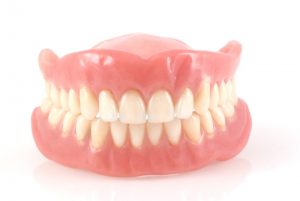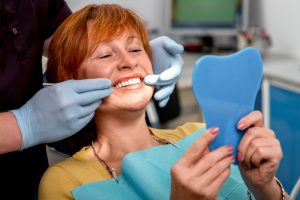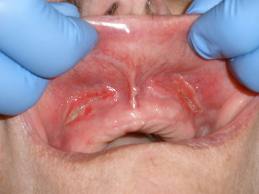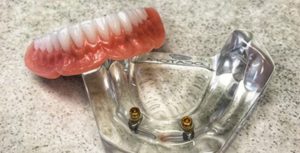
Troubled by ill fitting dentures? Learn to recognize the signs of a bad fit, grasp the health risks involved, and find immediate steps to take for relief and long-term solutions in this essential guide. Secure your comfort and oral health today.
Key Takeaways
- Persistent discomfort, difficulty with chewing and speaking, and increased reliance on adhesives are all indicators of ill-fitting dentures that require professional attention.
- Ill-fitting dentures can lead to various oral health problems, including tissue irritation, fungal infections, increased risk of oral cancer, and can impact your overall health by causing nutritional deficiencies and quality of life issues.
- Managing ill-fitting dentures includes seeking professional adjustments, timely relining, regular dental checkups, or considering alternatives like dental implants to improve oral health and overall quality of life.
Recognizing the Red Flags: Identifying Ill Fitting Dentures
Picture this: you’re trying to enjoy a meal, but your dentures keep shifting uncomfortably in your mouth. Or perhaps you’re experiencing persistent pain, a problem you didn’t sign up for when you first got your dentures. These are clear signs that your dentures may not be fitting as they should.
Recognizing these red flags early is paramount, as neglecting them could result in more severe oral health problems in the future, affecting both oral and overall health.
Discomfort and Pain
The journey with a new set of dentures often begins with a period of adjustment. Some discomfort is normal, particularly with lower dentures, which tend to be less stable. But what if the discomfort persists or escalates into pain? Persistent discomfort could indicate continuous damage to your gum tissues, leading to inflammation and infection. Such signs suggest your dentures may not fit correctly, necessitating professional intervention.
Trouble with Chewing and Speaking
Imagine trying to bite into a crunchy apple or articulate a complex sentence, but your dentures seem to have a mind of their own. If you’re persistently resorting to softer foods to alleviate discomfort, or your speech clarity is compromised, it’s possible that your dentures are not fitting as they should. Although some adjustment time is typical with new dentures, ongoing issues signal the need for a professional assessment.
Reliance on Adhesive
A little bit of denture adhesive can provide a sense of security, preventing your dentures from moving around. However, if you find yourself reaching for the adhesive tube more often than you should, it might be a sign that your dentures aren’t fitting properly. While adhesives can provide a temporary solution, they fail to tackle the root cause of the issue.
Ideally, well-fitted quality dentures should offer comfort and stability without the need for any adhesives, unlike loose dentures which may cause discomfort.
Oral Health Risks Associated with Poorly Fitted Dentures

While dentures, also known as false teeth, are a fantastic solution for missing teeth, they can’t fully replicate the function and feel of natural teeth. Poorly fitted dentures can pose several health risks, ranging from gum disease to fungal infections and even an increased risk of oral cancer.
To prevent such consequences, it’s vital to maintain well-fitted dentures and have them routinely examined by a dental expert.
Gum Tissue Damage
One of the risks associated with ill-fitted dentures is damage to the gum tissues. If your dentures are rubbing against your gums, it can cause irritation, leading to inflammation, raw spots, or even bleeding. Prolonged irritation can also lead to blisters and sores, resulting from the body’s defense mechanism against the constant scraping of the gums by the dentures.
Fungal Infections and Oral Diseases
Did you know that wearing ill-fitting dentures can even lead to oral infections, such as fungal infections and other oral diseases? Two significant infections associated with poorly fitting dentures are cheilitis and stomatitis, which result from an overproduction of yeast. Proper oral care and medication are required to treat these conditions, highlighting the significance of a well-fitted denture.
Increased Risk of Oral Cancer
Perhaps one of the most severe risks associated with ill-fitting dentures is the potential increased risk for oral cancer. Research has indicated that chronic irritation from poorly fitting dentures can potentially lead to serious oral conditions, including cancerous changes if such issues are not addressed.
This disturbing revelation emphasizes the importance of ensuring properly fitted dentures, as an ill fitting denture can cause significant discomfort and complications.
The Impact on Overall Wellbeing: How Ill Fitting Dentures Affect Your Health

The effects of ill-fitting dentures aren’t limited to oral health alone. They can have a substantial impact on your overall health and wellbeing. From nutritional deficiencies due to difficulty chewing, to quality of life concerns including anxiety and social withdrawal, ill-fitting dentures can have a profound impact on your daily life.
Nutritional Compromises
Imagine having to give up your favorite foods because chewing has become a chore. Ill-fitting dentures can significantly compromise your ability to maintain a healthy and balanced diet, leading to difficulty eating. As a result, you might find yourself relying on softer foods, which can lead to a reduction in diet quality and potential nutritional deficiencies.
Quality of Life Concerns
Beyond the physical discomfort, ill-fitting dentures can also affect your mental and emotional well-being. The constant anxiety of dentures falling out can lead to social withdrawal, and the impact on your appearance can lower self-esteem. Additionally, the physical discomfort from inflamed tissues can contribute to headaches and earaches, further affecting your quality of life.
Solutions for Poor Fitting Dentures
Now that we’ve examined the challenges and risks of ill-fitting dentures, let’s delve into the potential solutions. Professional adjustments and relining, as well as regular dental check-ups, can significantly improve the fit and comfort of your dentures.
Professional Adjustments and Relining
The shrinking of gums and jawbone due to the absence of tooth root stimulation can cause dentures to become loose and uncomfortable over time. Professional modifications and relining can improve denture fit and comfort, accommodating natural bone atrophy and changes in the shape of the mouth.
Importance of Regular Check-Ups
Frequent dental check-ups are crucial for ensuring the right denture fit and maintaining overall oral health. During these check-ups, your dentist can address any problems with your dentures, ensuring they fit properly and prevent pain. Regular assessments can also prevent the excessive need for frequent relining.
Transitioning to Alternatives: Dental Implants and Other Options
If dentures aren’t serving your needs adequately, it’s worth considering other viable alternatives.
Dental implants offer a more secure fit than traditional dentures and contribute to the preservation of jawbone integrity.
Advantages of Dental Implants
Dental implants offer several advantages over traditional dentures. From fixed and removable options for implant-supported dentures to innovative techniques like the All-on-4® technique, dental implants can significantly improve the quality of life for those who wear dentures.
Evaluating Your Options with a Dentist
The decision to choose the appropriate tooth replacement option should be made in collaboration with a dental professional. They can explain the unique benefits of each option, aiding you in making an informed decision that best suits your individual needs and lifestyle.
Summary
In our journey, we’ve covered the signs of ill-fitting dentures, the potential health risks they pose, and the impact they can have on your overall wellbeing. We’ve also explored various solutions to these issues, including professional adjustments, regular check-ups, and alternative options like dental implants.
Frequently Asked Questions
How do you fix ill-fitting dentures?
To fix ill-fitting dentures, you can have them readjusted or relined, use denture adhesive, or consider getting them remade or switching to dental implants if the issue is severe. Ultimately, seeking professional dental assistance may be necessary.
What happens if you have ill-fitting dentures?
Ill-fitting dentures can cause chronic irritation to the gums, leading to inflammation known as stomatitis. If not treated, it can result in uncomfortable ulcers.
Can dentures be adjusted to fit tighter?
Yes, dentures can be adjusted by your dentist to fit tighter in your mouth for a better fit and comfort. It’s important to schedule an appointment with your dentist if you notice your dentures becoming loose.
What if I am not happy with my dentures?
If you are not happy with your dentures, the first step is to contact your dentist for an examination and evaluation of your options. They can then determine whether repairing or replacing your dentures is the best solution.
What potential health risks are associated with ill-fitting dentures?
Ill-fitting dentures can lead to gum tissue damage, fungal infections, and an increased risk of oral cancer. Protect your oral health by ensuring properly fitting dentures.





I’m a 60yr old female on disability with RSD and CNS Lymes Disease and other heth concerns. Since diagnosis of the CNS Lymes Disease I’ve lost several teeth. I am having difficulty with the partial denturesthat I have. My brother is visiting from California and has “implant removable dentures”, at a considerable cheaper cost than permanent implants. I didn’t even know this was an option? I would appreciate any possible aassistance that I could receive. Thank you, Kelly Ann Voyce
Kelly, Please schedule a free consultation with us here: https://rockvilledentalarts.com/appointment-booking-form/